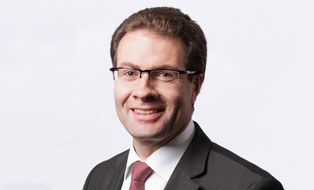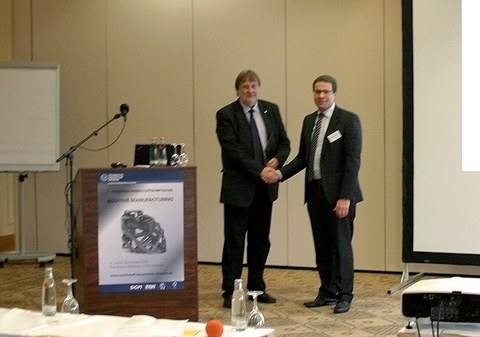Dec 16, 2016
»3D-Printing« experts meet at the TU Dresden
At the invitation of the Institute for Materials Science at the TU Dresden, 100 specialists in the field of additive manufacturing came to Dresden to exchange know-how on the 8th and 9th of December 2016. By using this innovative so called »3D print« manufacturing process parts can be made from plastics, ceramics and metals often from many thousands of single layers, without having to use any expensive tools. Therefore, it is possible to make complex parts in small numbers, where parts made by conventional manufacturing processes would not be producible or too expensive to make.
»With additive manufacturing we unlock new possibilities for the manufacture of products with up to now unreachable properties – we are talking about disruptive innovation. We can make targeted changes with 3D printed materials, where we need for example a particularly high stability or where a particular physical property like electrical conductivity or thermal insulation is necessary«, explained Prof. Leyens of some of the advantages. The director of the Institute for Materials Science is himself an internationally recognised expert for additive manufacturing and is responsible as a member of the directorship of the Fraunhofer IWS Dresden for the European-wide unique »Centre for Additive Manufacturing Dresden« that is run in conjunction with the TU Dresden.
Prof. Gerhard Rödel, prorector for research at the TU Dresden, in his welcome speech highlighted the importance of co-operation in the scientific region of Dresden. »The complex scientific-technological challenges, that are connected with additive manufacturing, are best solved in a network of different specialists. The connectivity that is achieved by the TU Dresden with external research institutes through the research alliance »DRESDEN concept« is found in no other place in Germany, which gives the region an invaluable competitive advantage to find the best solution«
The possibilities and challenges of additive manufacturing were discussed at this year’s 6th Dresden Materials Symposium. Renowned speakers from science and industry illustrated the scientific challenges for the fields of material and manufacture engineering as well as the width of possible uses. Whether for aerospace, for energy and medical engineering or for the car industry, additive manufactured products will gain importance in the future for manufacturing and the end-user. Individually printed mobile phone covers are only the beginning, likewise for 3D printing where recently an American DIY store is now able to quickly supply the customers with replacement or special parts.
Contact
 © Christian Hüller
© Christian Hüller
Professor
NameMr Prof. Dr.-Ing. habil. Christoph Leyens
Institusdirektor, Professor für Werkstofftechnik
Send encrypted email via the SecureMail portal (for TUD external users only).

